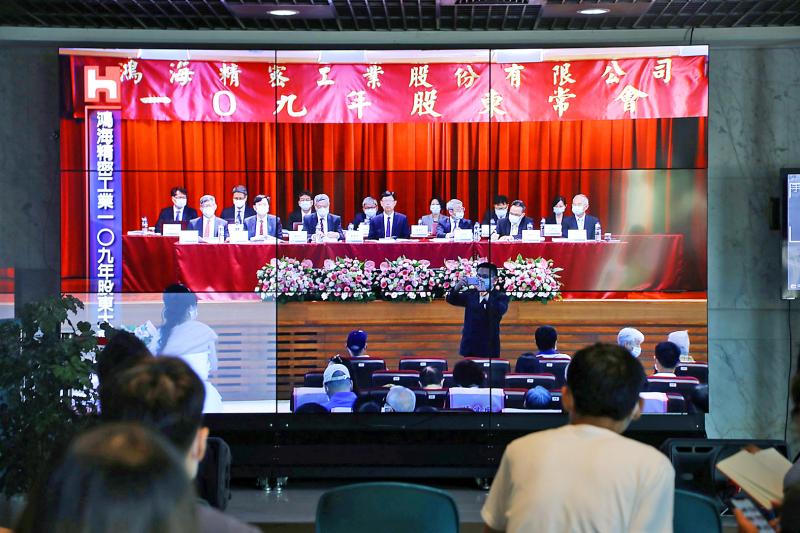Hon Hai Precision Industry Co (鴻海精密) has spent an additional US$350 million on a subsidiary in India that industry sources believe is soon to begin manufacturing Apple Inc’s iPhone 13.
Hon Hai, known internationally as Foxconn Technology Group (富士康科技集團), said in a statement on Friday that it has invested US$350 million in Foxconn Hon Hai Technology India Mega Development Private Ltd as part of its long-term development in the country.
The investment — part of Hon Hai’s expansion of its plant in Chennai in southeast India — would be used to set up a new production line exclusively for the assembly of the iPhone 13 series, industry sources said.

Photo: Reuters
Media reports said that Apple has started to produce iPhone 13 models on a trial basis from Hon Hai’s factory in Chennai, with commercial production set to begin in February.
Hon Hai had manufactured iPhone XR, 11 and 12 models in Tamil Nadu, southern India, the reports said.
Hon Hai, the world’s largest contract electronics maker, has become Apple’s most important iPhone assembler. Apple accounts for about 40 percent of the Taiwanese company’s total sales.
The company is to restart production at the Chennai factory after its temporary workers, mostly women, staged a protest on Dec. 18 over conditions in their living quarters and food quality, the Tamil Nadu Government said in a statement on Saturday.
The company has agreed to all demands made by the employees, the government added.
Hon Hai promised to improve the temporary employees’ working and living conditions by expanding their living areas, upgrading bathing facilities and providing drinking water, among other improvements, it said.
Separately, Hon Hai’s Hong Kong-listed subsidiary FIH Mobile Ltd (富智康) is planning a spinoff of its unit in India, Bharat FIH Ltd, and has set its sights on listing the Indian company’s shares on the Bombay Stock Exchange and the National Stock Exchange of India.
Hon Hai, which owns a 63.43 percent stake in Bharat FIH, said that the Indian unit submitted documents pertaining to a listing to the two exchanges on Wednesday.
The spinoff of the Indian unit would be completed in 2023, Hon Hai said.
Bharat FIH, which is the largest contract electronics maker in India, operates three production sites in southern India and produces a range of goods, such as cellphones, machinery, electric vehicles, TVs, handheld devices and Internet connectivity gadgets, Hon Hai said.
Additional reporting by Bloomberg

CHAOS: Iranians took to the streets playing celebratory music after reports of Khamenei’s death on Saturday, while mourners also gathered in Tehran yesterday Iranian Supreme Leader Ayatollah Ali Khamenei was killed in a major attack on Iran launched by Israel and the US, throwing the future of the Islamic republic into doubt and raising the risk of regional instability. Iranian state television and the state-run IRNA news agency announced the 86-year-old’s death early yesterday. US President Donald Trump said it gave Iranians their “greatest chance” to “take back” their country. The announcements came after a joint US and Israeli aerial bombardment that targeted Iranian military and governmental sites. Trump said the “heavy and pinpoint bombing” would continue through the week or as long

TRUST: The KMT said it respected the US’ timing and considerations, and hoped it would continue to honor its commitments to helping Taiwan bolster its defenses and deterrence US President Donald Trump is delaying a multibillion-dollar arms sale to Taiwan to ensure his visit to Beijing is successful, a New York Times report said. The weapons sales package has stalled in the US Department of State, the report said, citing US officials it did not identify. The White House has told agencies not to push forward ahead of Trump’s meeting with Chinese President Xi Jinping (習近平), it said. The two last month held a phone call to discuss trade and geopolitical flashpoints ahead of the summit. Xi raised the Taiwan issue and urged the US to handle arms sales to

State-run CPC Corp, Taiwan (CPC, 台灣中油) yesterday said that it had confirmed on Saturday night with its liquefied natural gas (LNG) and crude oil suppliers that shipments are proceeding as scheduled and that domestic supplies remain unaffected. The CPC yesterday announced the gasoline and diesel prices will rise by NT$0.2 and NT$0.4 per liter, respectively, starting Monday, citing Middle East tensions and blizzards in the eastern United States. CPC also iterated it has been reducing the proportion of crude oil imports from the Middle East and diversifying its supply sources in the past few years in response to geopolitical risks, expanding

Pro-democracy media tycoon Jimmy Lai’s (黎智英) fraud conviction and prison sentence were yesterday overturned by a Hong Kong court, in a surprise legal decision that comes soon after Lai was jailed for 20 years on a separate national security charge. Judges Jeremy Poon (潘兆初), Anthea Pang (彭寶琴) and Derek Pang (彭偉昌) said in the judgement that they allowed the appeal from Lai, and another defendant in the case, to proceed, as a lower court judge had “erred.” “The Court of Appeal gave them leave to appeal against their conviction, allowed their appeals, quashed the convictions and set aside the sentences,” the judges